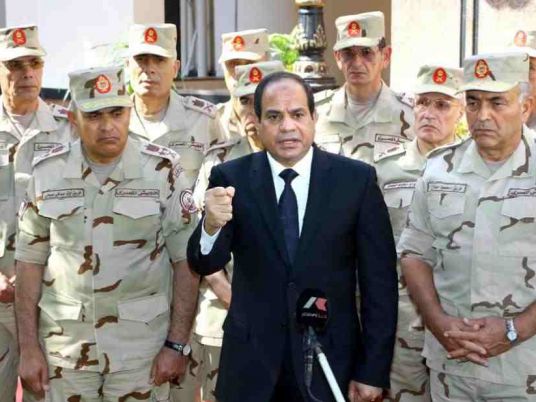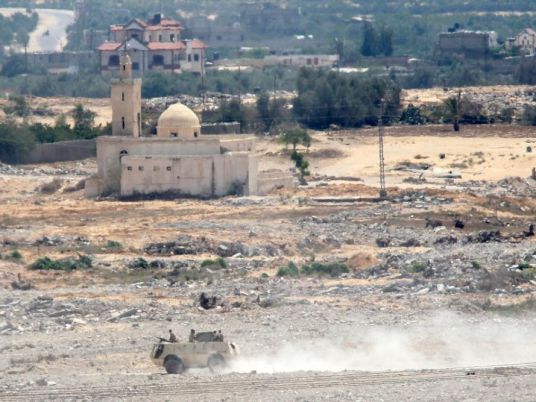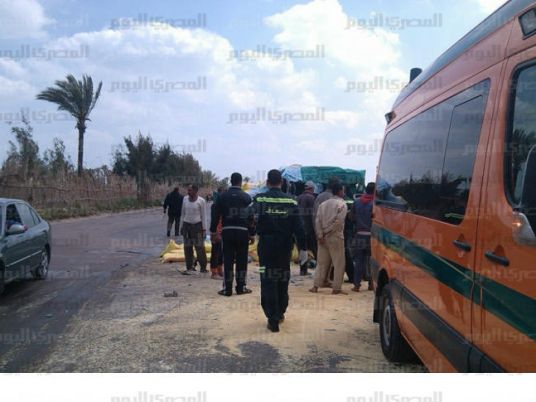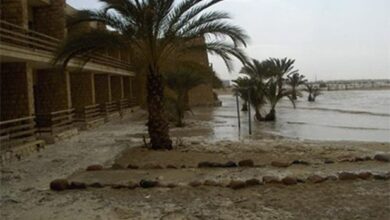North Sinai–In many villages in North Sinai, particularly those near the bend in the Wadi el-Arish river, people lie awake at night. It’s not just their dire conditions that prevents these Sinai residents from sleeping. They also fear the next wave of floods.
The village of Abu Thaqal, north of Arish, was among the towns hardest hit by the flood, in large part because it lies next to the mouth of the valley. Of a cluster of houses that once sheltered seven families, what remains is a collection of partially destroyed buildings with flooded interiors where the water reaches two meters above the ground.
“We had been putting together this house for 18 years. Each year, we added to it. Now, we have to start from scratch,” says Raed, who owns one of the houses. He has a wife and a 10-year-old daughter, who now live alongside other families in a two-square-meter backroom, one of the few places that survived the floods. “We count on God now, and civil society that came to our aid, not the government.”
Taking about the floods that erupted last Tuesday, Raed and others in the area leveled harsh criticism against the government for a variety of reasons. They asked why licenses were given to build on the riverbed, which was in danger of flooding. They described the emergency response by local authorities as slow or absent. And they remain confused about what kind of compensation they will receive from the state.
Raed, who is a casual laborer, says most of his possessions were lost in the floods.
“Do I spend the little money I earn on rebuilding my life at 33 or do I focus on building a life for my daughter?” he says.
According to Raed, a tourist resort that was built by North Sinai Governorate in front of Abu Thaqal shifted the riverbed their side, causing much damage in the area. “They spend lots of money on squash and tennis courts while our children don’t know what squash and tennis mean,” he says. Driving by the tourist village, Al-Masry Al-Youm saw only water dumps and destroyed fences.
Standing behind Raed, his daughter walks through the muddied water. She has bare feet because her shoes and slippers were washed away in the flood. She says it was good that final exams finished before the floods: she also lost all of her schoolbooks.
As she looks over the destroyed house, flooded clothes, damaged kitchen and broken beds, tears fall from her eyes. “It’s been a week, but we were told not to clear the mess because the governorate [delegates] will come to evaluate the damage and give us compensations, but we have seen nothing,” Raed says.
Raed’s neighbor Yasser, 32, works picking dates during the harvest season. When the floods broke out, he says he was completely disoriented.
“My wife is nine-months pregnant. My son hurt himself while running and my two daughters went crying hysterically. I didn’t know what to do,” he says. “The government is doing nothing for us but giving pain-killing talk. Those whose hands are in water are not like those whose hands are in fire.”
Both Yasser and Raed have heard that the government is compensating flood victims, but nothing has reached them yet. Moreover, the details remain murky. One heard that each family should receive LE100, a tent and a bed cover, while the other heard that each family will receive LE25,000.
“The governor has decided to give out LE25,000 for destroyed houses and will estimate the losses incurred over the next few days,” says Muhammad el-Kiki, the secretary general of North Sinai Governorate and supervisor of the post-flood emergency operation.
Until this aid materializes, people in the area have been depending on non-governmental organizations. On Monday, aid was distributed in different areas in North and Middle Sinai. At the Lawyers Syndicate, three trucks had just arrived from Cairo carrying eight tons of food, covers and cloth. The donations came from different political parties and citizens, and the collection was organized by the Hisham Mubarak Law Center (HMLC).
The movement of aid into Sinai has not been hassle-free. The HMLC trucks were delayed en route.
“We left Cairo at 1:00 AM and reached Arish at 11:00 AM,” says Haitham Mohammadein, a lawyer with the center. “We were kept for two and half hours at the Salam Bridge as officers were contacting state security for permission."
Another truck carrying aid collected by the Popular Campaign in Support of Palestinian People in Damietta was delayed on the bridge for seven hours. “We were kept on the bridge despite the fact that we notified the authorities about the truck and the goods on board. I think it’s a lack of coordination between state security in Arish and Ismailia,” says Ahmad el-Ashmawy, a social worker with the campaign.
Fears are now mounting that the next flood could affect the Rawafe’ Dam, which is 45 km from Arish and which is thought not to be able to stand a stronger wave. But the government assures people of the dam’s safety.
“The dam keeps away 5.3 million cubic meters of water and it won’t be affected. There are an additional 200 compensating dams that will be completed along the riverbed by the end of January,” says el-Kiki. Other existing dams made of sand and stone have been established through popular efforts, with the support of a Japanese research agency, the Sinai Urbanization Project, and the World Food Programme.
The people of North Sinai see this crisis as man-made. “You have three groups of people here,” says Bahaa Badawi, who works with the Arab Doctors’ Union implementing relief in the area. “Bedouins are one group and they are aware of the flow of the riverbed. So they never build houses there and hence had the fewest losses. The second group of people has only quick profitability in mind, so they built on the riverbed and lost all their buildings. A third group thought that the floods will never come back, and they also lost a lot.”
In addition to the tourist village, projects being implemented by the governorate on the riverbed include a students’ camp space affiliated with the University of the Suez Canal, according to Ghanam Sayed, coordinator of Iqra’ NGO, which has been distributing relief aid. “Those projects have cost millions of pounds and 90 percent of them are lost now.”
“What happened is the product of corruption and negligence. It’s man-made,” says Abdul Kerim Qassas, who lives in the village of Mellim, east of Arish. According to Qassas, about half of the village’s residents lost their houses in the floods. “There were alarms 24 hours ahead of the floods, yet no action was taken.”
He says one of the governorate-sponsored projects that changed the course of the river was a nearby marketplace bringing together the area’s street vendors. He pointed at the area, which today is just a big puddle. “All governors involved in those projects should be sued.”
A source within the North Sinai Governorate, who requested anonymity, told Al-Masry Al-Youm that the prime minister is investigating the issue of buildings and projects set on the riverbed, and that the process goes beyond the governorate.
According to North Sinai Governorate, five people died during the floods, 564 houses were destroyed, and 82 roads were disrupted.
“El-seil kheir!” says Fayez Abu Harb, a member of parliament from Arish belonging to the ruling National Democratic Party, to Al-Masry Al-Youm, recalling the Egyptian saying "The floods are a blessing."
“Think of all the good land we will be getting after so much drought for the past ten years,” Abu Harb says. When asked about the emergency response by the government, he says, “There are positives and negatives. We don’t need to over-emphasize the negatives. The government needs encouragement.”
But "blessing" is not the word that those who were affected by the flood would use. Qassas, a retired man who was involved, as the director of the social affairs office in Arish, in relief efforts after the last flood in 1981 in North Sinai, said that a government response in the current crisis has thus far been lacking. “And yet the 1981 flood was much lighter than this one,” he says.
“People’s lives mean nothing to the government. The Sinai citizen in particular means nothing to the government. It shouldn’t come later and say there’s no sense of belonging in Sinai,” Qassas says.




